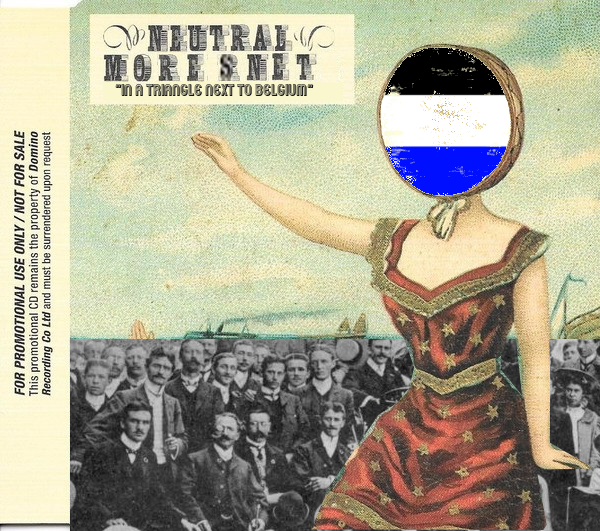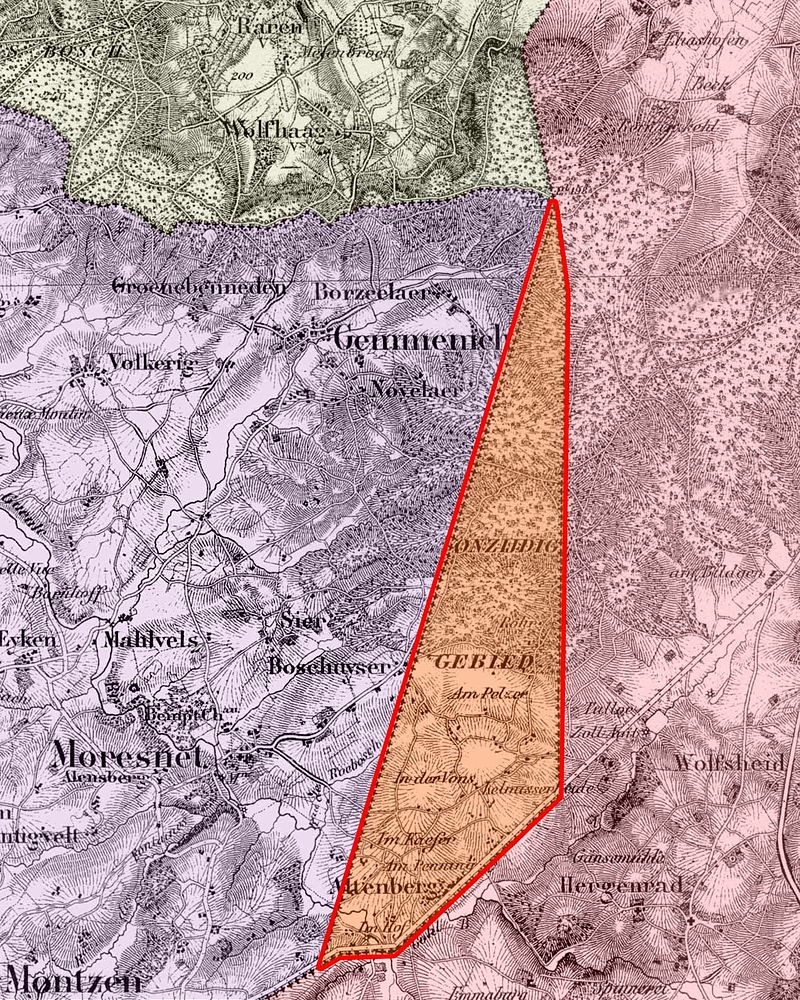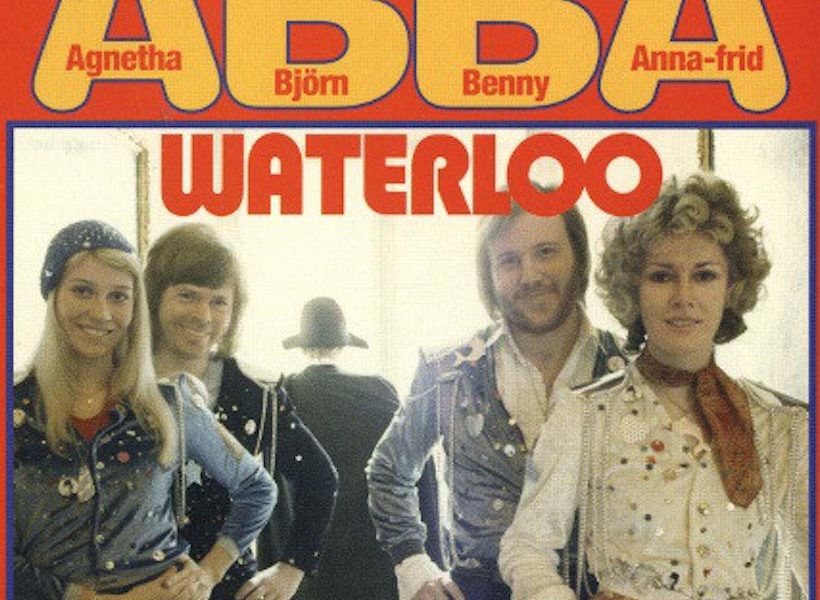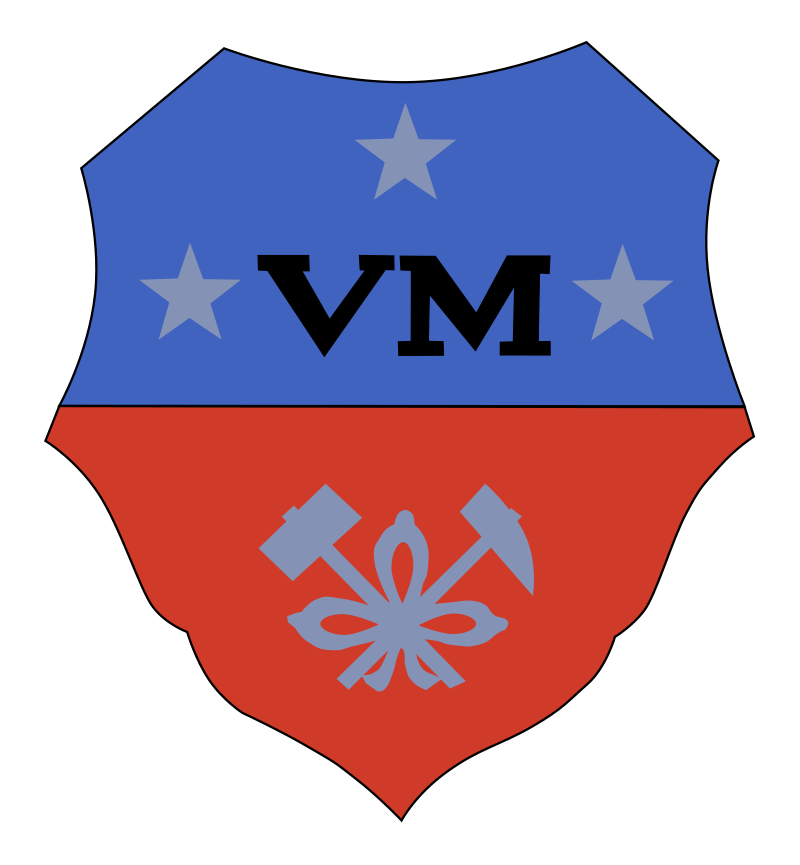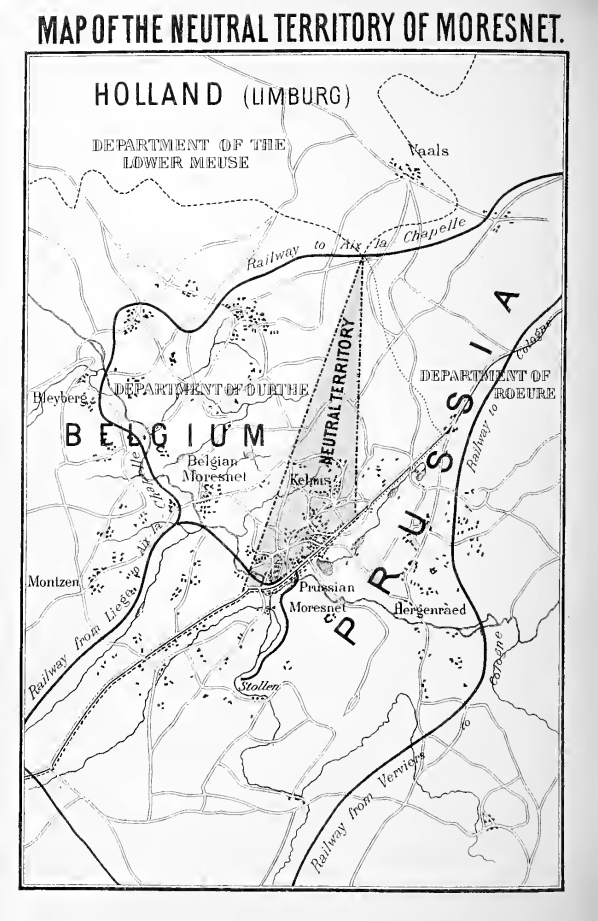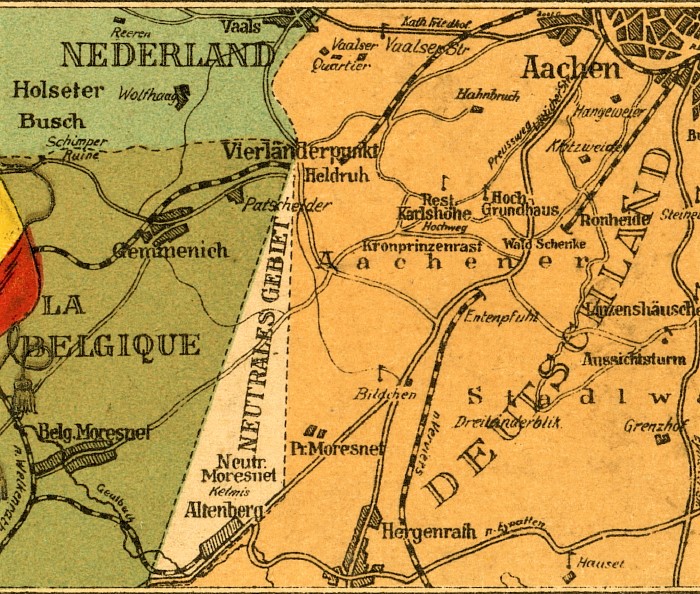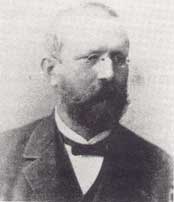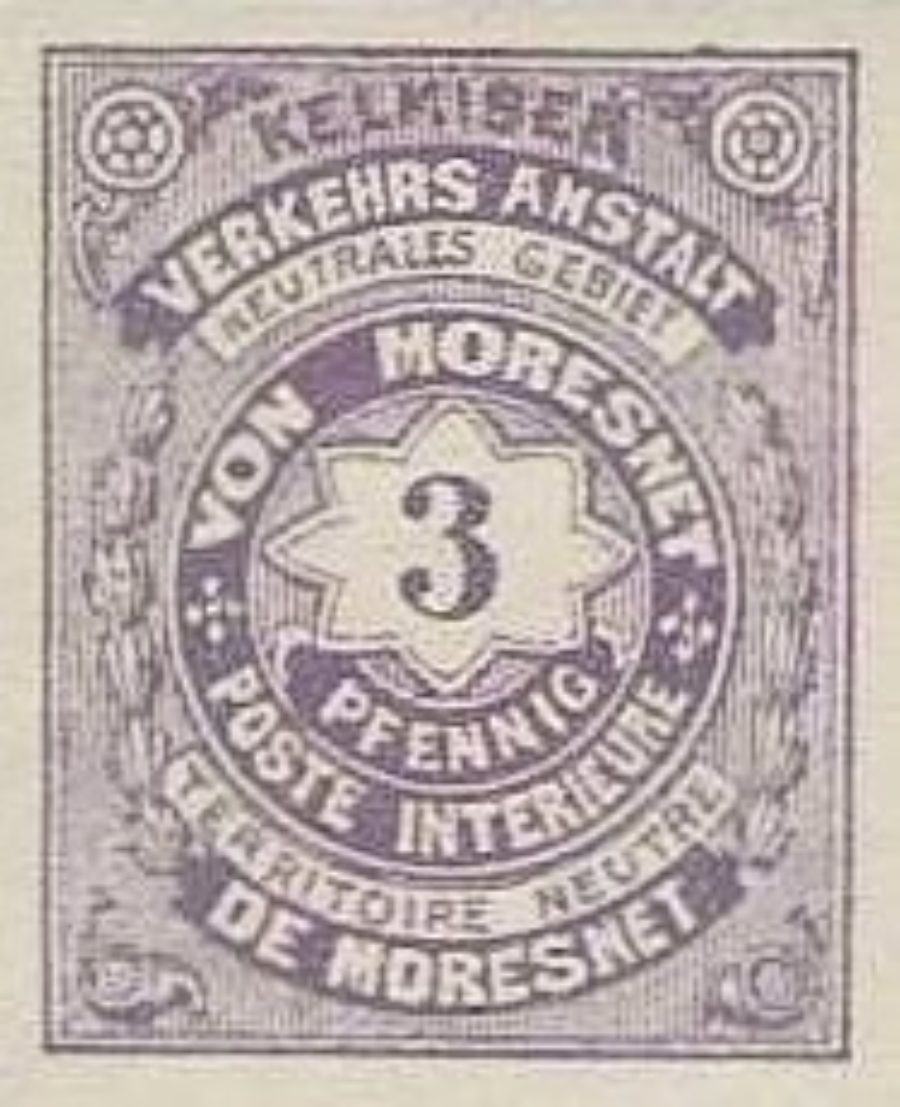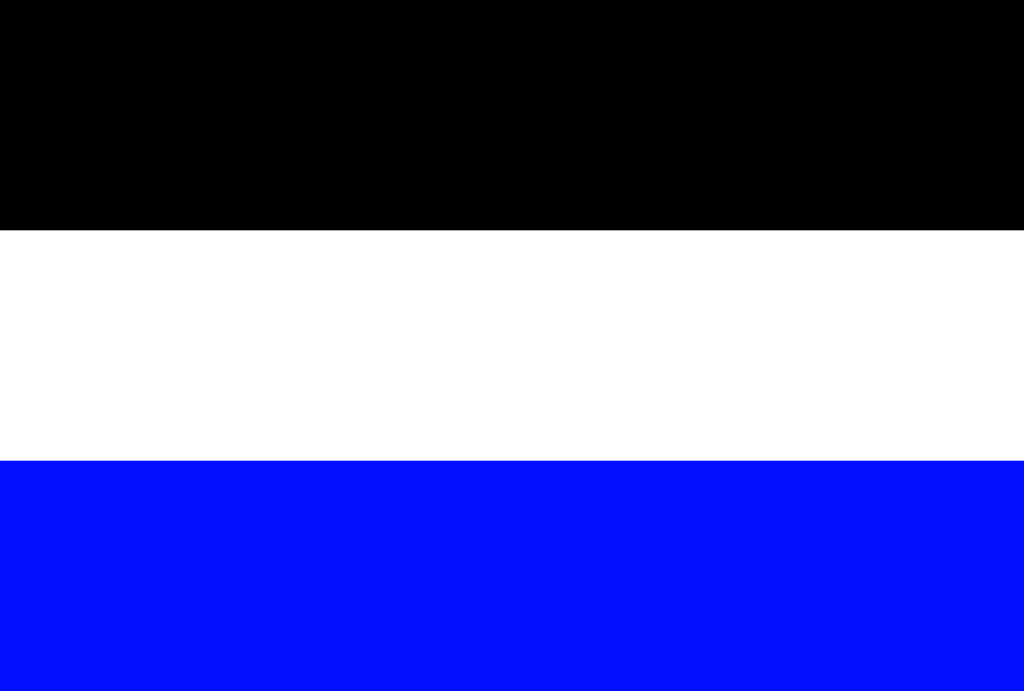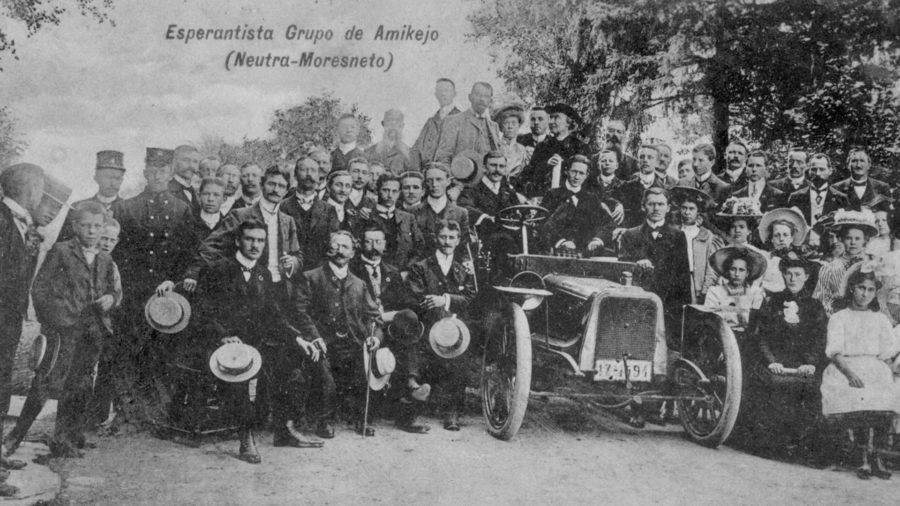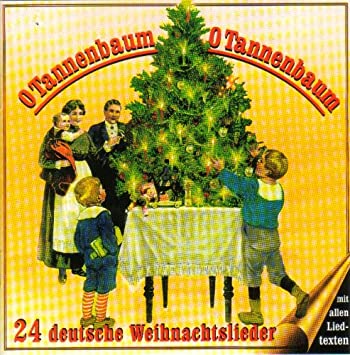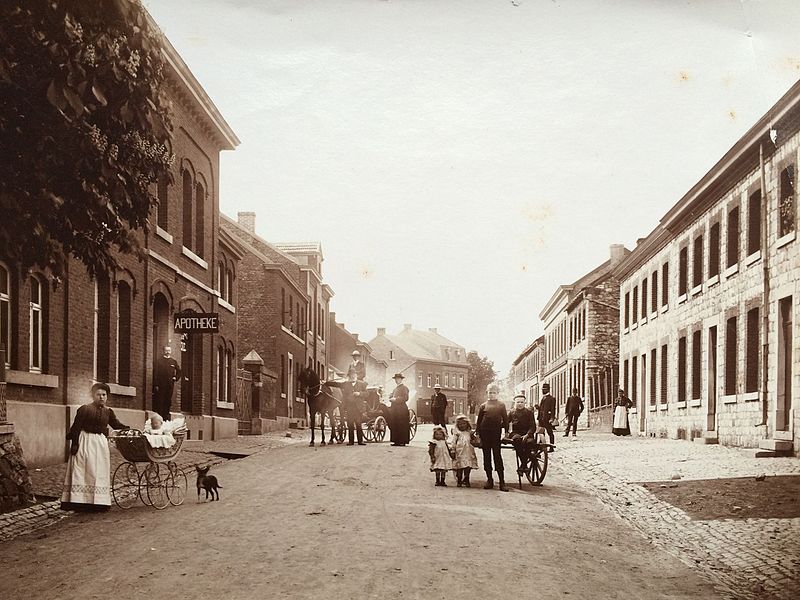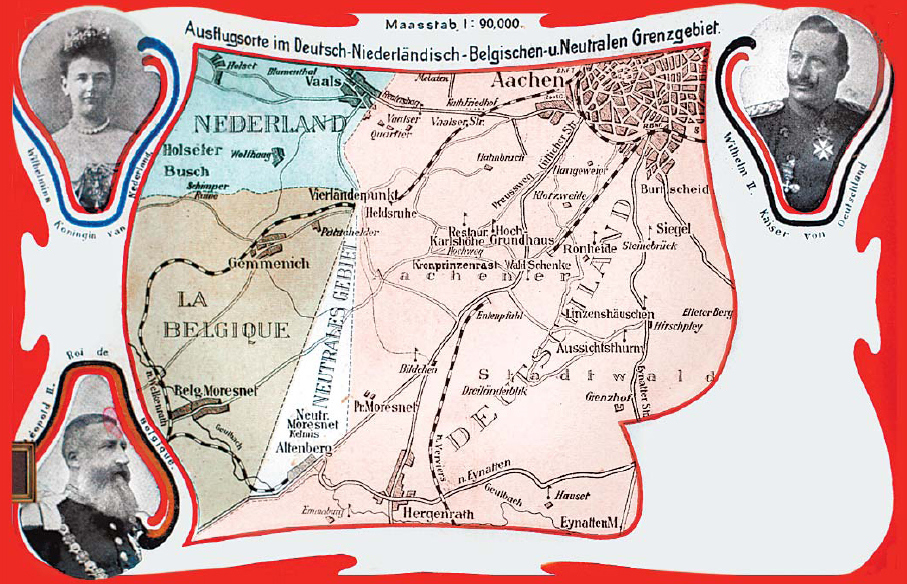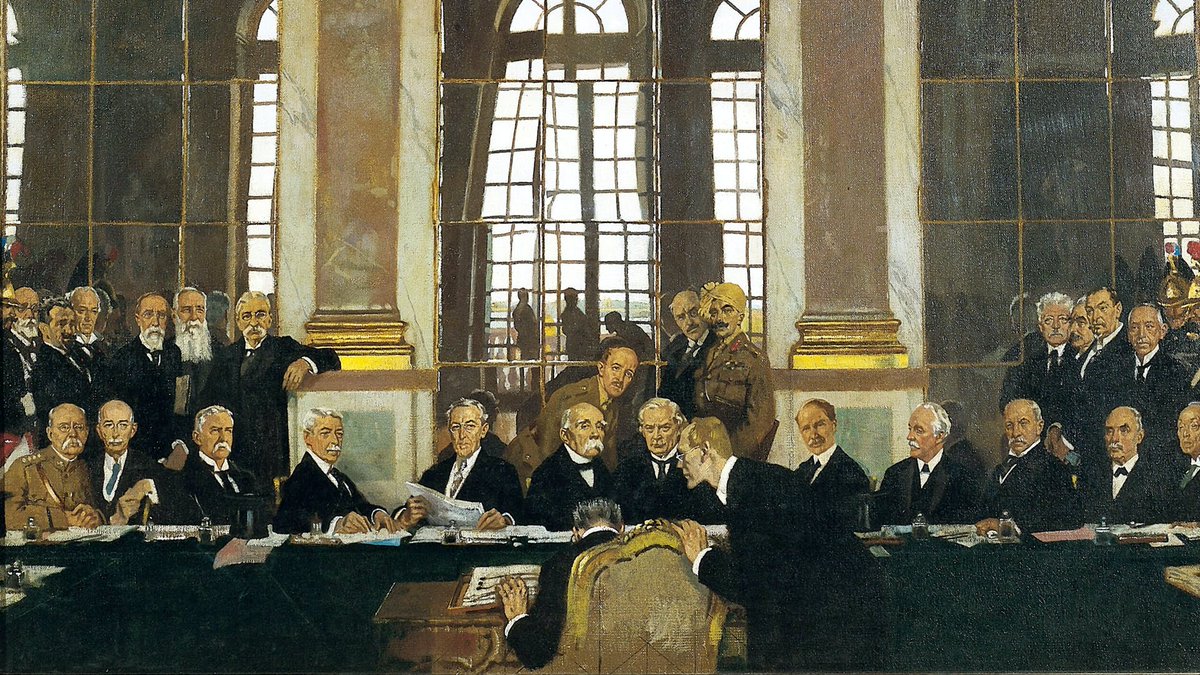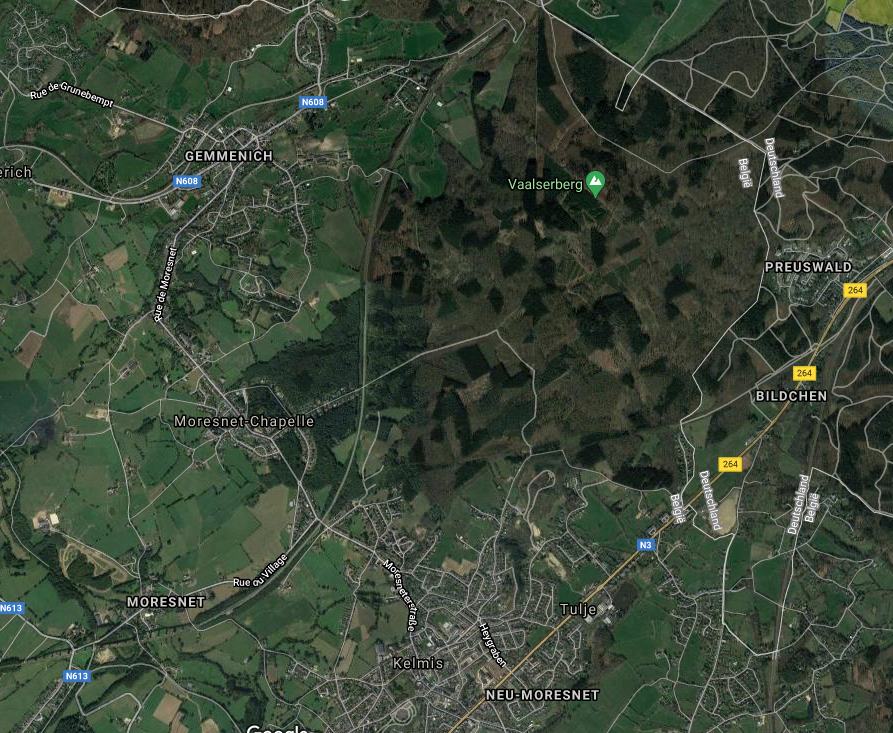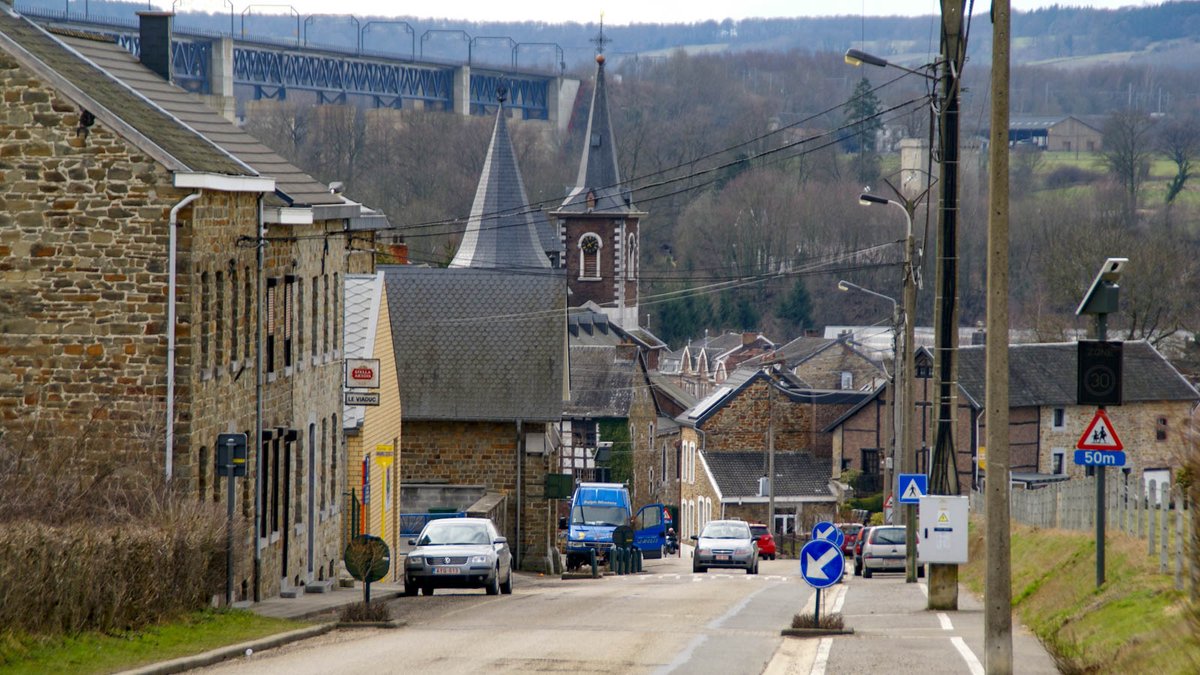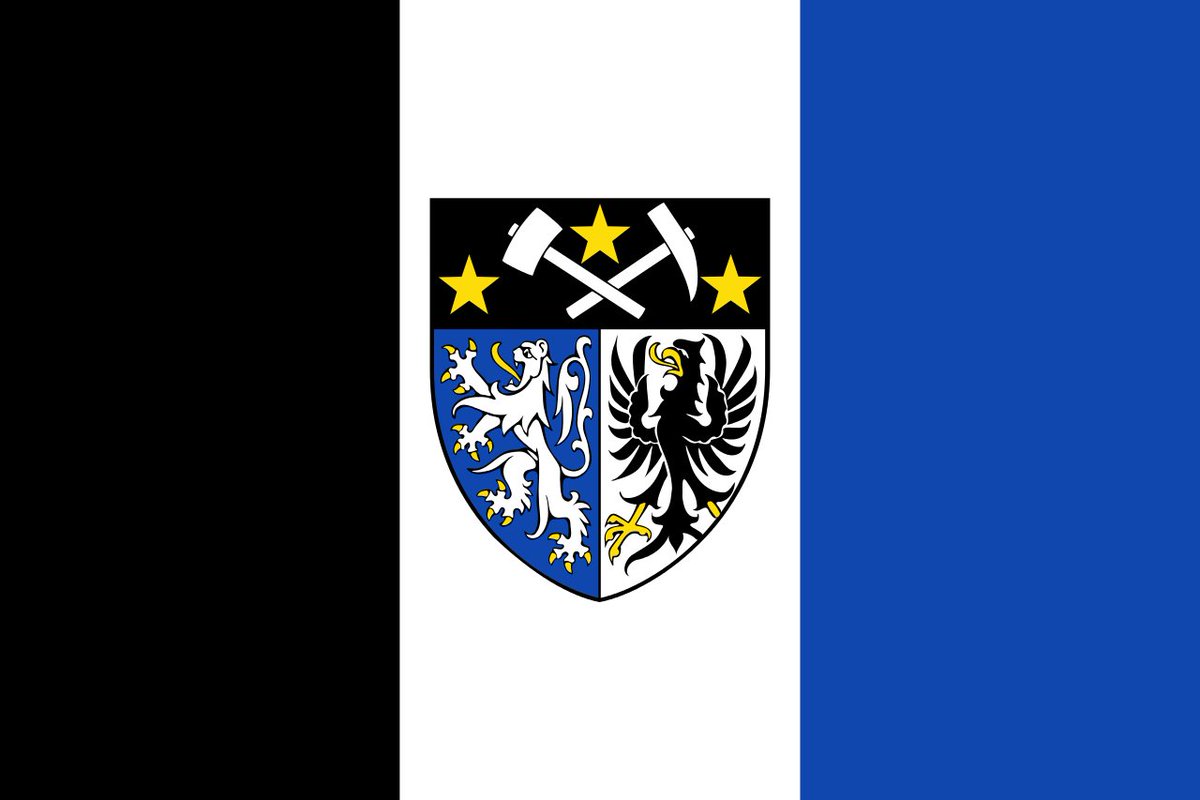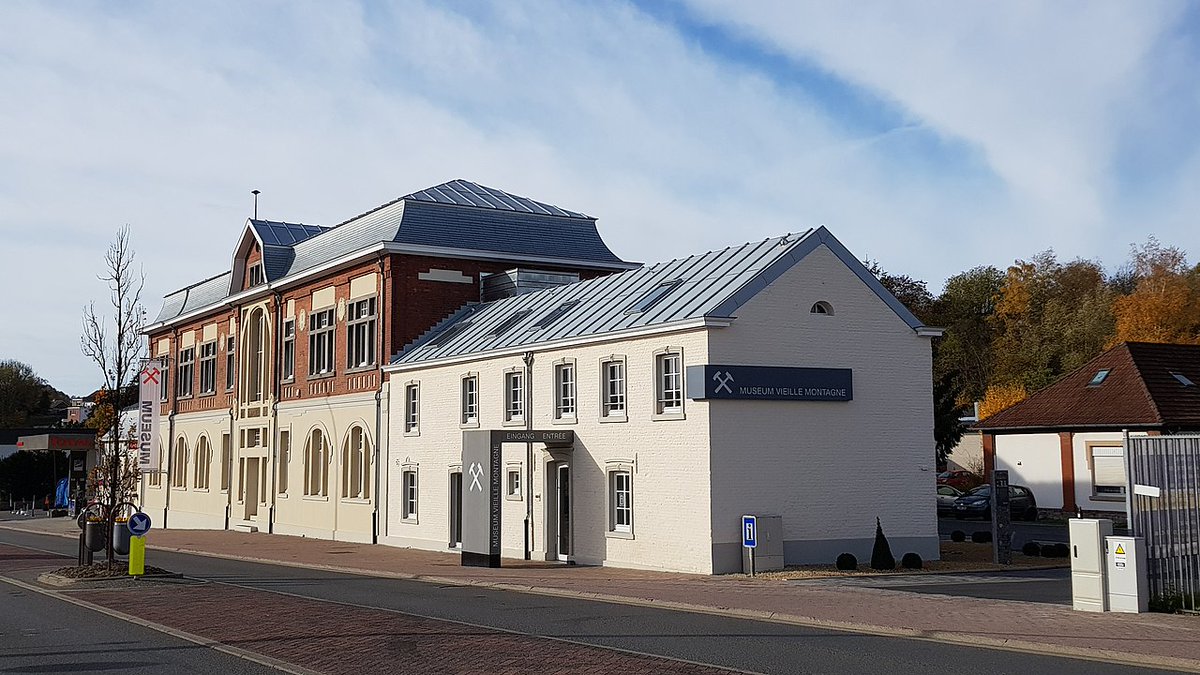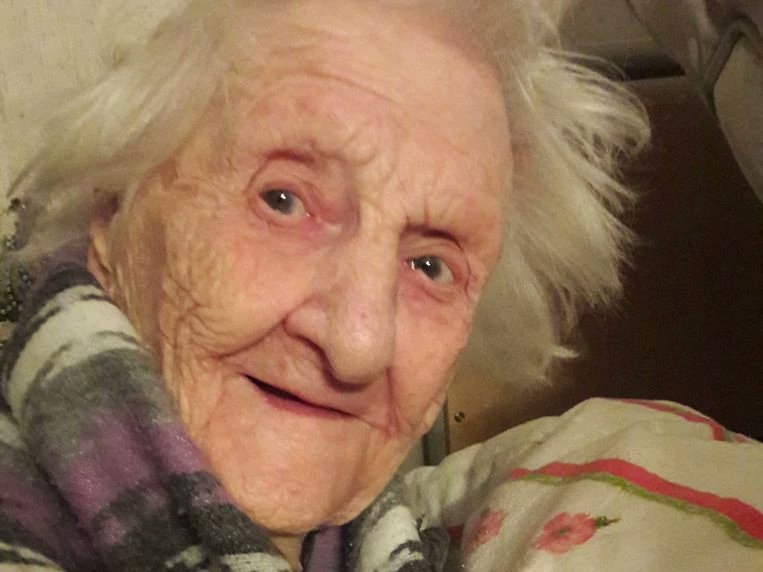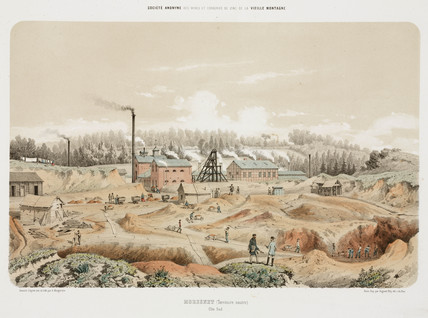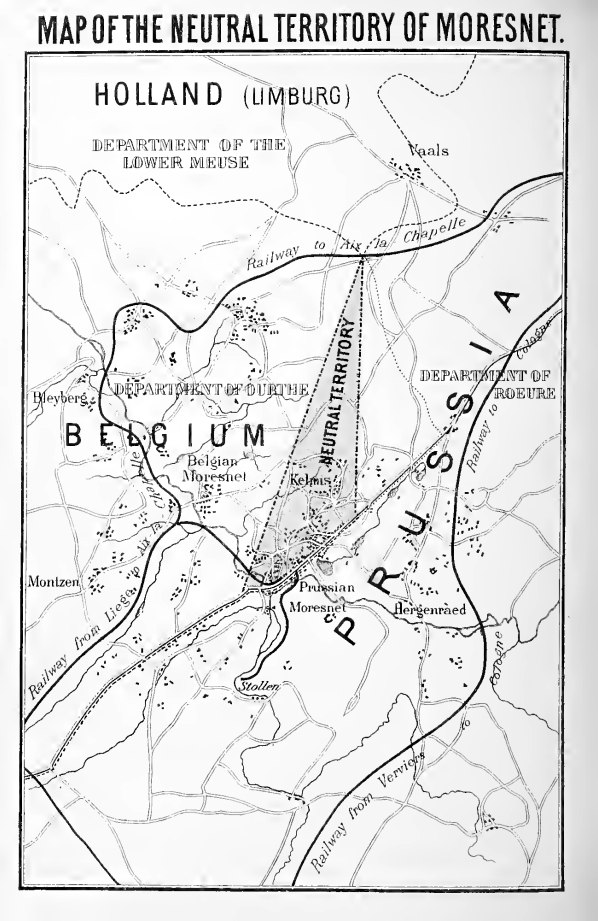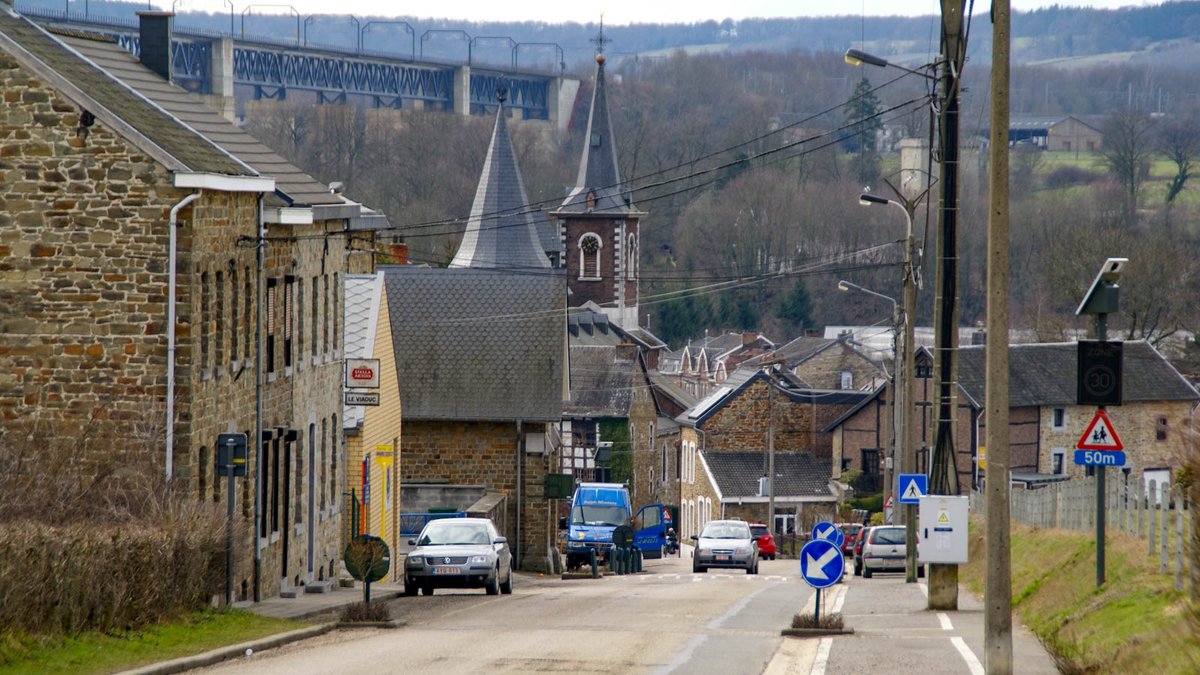Europe is known for its microstates - Monaco, Andorra, San Marino, Vatican City (Luxembourg is too big to count) - but for 104 years, a curiosity of a microstate existed smack in the middle of Western Europe that nobody today even remembers.
Welcome to Neutral Moresnet. Thread>>
Welcome to Neutral Moresnet. Thread>>
Vaguely triangular, and slightly smaller than Richmond Park in London, Neutral Moresnet sat between Belgium and Germany, close to the city of Aachen, and with its pointiest end just barely touching the highest point of the Netherlands. There was barely anything inside it.
(Incidentally, that aforementioned highest point of the Netherlands, the Vaalserberg is only 322m high, which reflects why it's called the Low Country, I guess. Look at it, it's like a bump with trees on.)
So why did this confusingly neutral triangle exist in first place, and where did it go? Why did this pointy chunk of lowl-lying confusion not belong to any of its neighbours, and why has Neutral Moresnet never entered Eurovision?
It's down to wars, zinc, and Europeans squabbling
It's down to wars, zinc, and Europeans squabbling
In the early years of 19th century, Napoleon's army steamrolled across Europe in a fashion not seen for centuries, not merely playing politics, but trying to bring everything under the tricolour. Finally, Russian winter halted the advance, and in 1815 he met his Waterloo (my-my!)
Europe's powers considered that this had made a huge mess of the map and at a grand Congress in Vienna, this prototypical UN argued out what was to be done to fix things, with everyone (bar France) trying to get as much out of the situation as possible. It was a free-for-all.
One particular sticking point was a zinc mine located in the pretty hills and forests by the village of Moresnet, a village claimed by both Prussia ("Germany: the Prequel") and the United Kingdom of the Netherlands (Belgium and the Netherlands back when they had a thing going on)
Zinc (and brass) was an extremely useful metal for an industrialising Europe, but the only places to get it were from Bristol in England - and the British weren't in a sharing mood - and the mine at Moresnet. The bigwigs in big wigs thus all wanted a slice. Let that zinc in.
The newly agreed borders mostly followed existing claims of what noble owned what (in 1815, the idea of the nation state was not yet the rule) but Moresnet had rival, overlapping claims. So Prussia and the United Netherlands agreed to share it, like flatmates with a drying rack.
The village of Moresnet went to the Dutch. Another village, also called Moresnet (as more Moresnet means a greater net Moresnet) went to Prussia. And the valuable zinc mine was left in between, a buffer that belonged to both kingdoms, or neither depending on your point of view.
This mine, with the village surrounding it (yup, it was also called Moresnet) became the Undivided Territory of Neutral Moresnet, an anomaly where neither the Dutch nor Prussian armies were allowed, but both countries could access the valuable zinc to make their brass doorknobs.
Not quite a state but not part of any state, the citizens of Neutral Moresnet were in a unique situation. Dubbed 'Neutrals', they had no conscription - even if Moresnet could form a tiny army, they weren't allowed - and no tax, while enjoying profits from the shiny shiny zinc
(well, I say profits, but as ever, the majority of the wealth went to the company that owned the mine - the Vieille Montagne Zinc Mining Company - but still, as far as early 19th century Europe went, it was very much one of the better places to be)
Meanwhile, because neither the Dutch or Prussians could enforce their own legal systems over a territory they did not own, Neutral Moresnet remained technically under the Napoleonic Code, and magistrates (borrowed from neighbouring countries) would have to judge according to that
Officially, a joint administration ran the territory, but over the decades, this watered down to a few local civil servants. This administration appointed a mayor, who appointed a council (there was no democracy here), and with no courts to speak of, the rule was absolute.
Even so, there was a single lawman and no jail so Neutral Moresnet became an attractive prospect for those fleeing from the law - you can't get extradited from a state that doesn't exist. Between that, the mine's wealth, and the lack of taxes and conscription, the population grew
The population grew from 256 in 1815 to several thousand by the 1850s, and the mining company set up shops, and even a small hospital and bank. The all-powerful mayor opened schools, and so it seemed almost like a regular place IF you didn't look too closely.
If you were a Neutral, you didn't belong to any state, and that caused problems if you ever had cause to go anywhere else, even if the officials at the borders and ports had heard of Neutral Moresnet in the first place...which was fairly unlikely.
"I'm Neutral!"
"Good for you m8"
"I'm Neutral!"
"Good for you m8"
Of course, being a mining town with limited law meant it became a rough place where miners (mostly men) worked hard and played hard, with taverns, bawdy cabarets, and brothels. Smugglers used the ample woodland to sneak alcohol across the border, safe from pursuit. It was wild.
Pregnant women would also move to Neutral Moresnet to ensure their children would be born Neutral and therefore ineligible for conscription by any of the big powers, but on the flip side, this meant they would be sent into the mine by the Mining Company as young as age 6. Yay???
In 1830, Belgium decided that things just weren't working out with the Netherlands, and in the words of Fleetwood Mac, went its own way, taking all but a tiny point of the Moresnet-bordering land. This meant that the Dutch claims on Moresnet were instead inherited by Belgium!
The Belgians got annoyed with Belgians avoiding conscription into the Belgian army by going to Neutral Moresnet (not Belgian Moresnet) and in 1854 the Belgians stopped Belgians from avoiding the Belgian army this way by claiming Belgians in Moresnet were still Belgians.
Prussia did the same (for Prussians not Belgians) in 1874, shortly before Prussia ganged up on almost every other German speaking state and became Germany. Now tiny Neutral Moresnet was squeezed between giant Germany and belgiummy-sized Belgium...but they had bigger problems.
Neutral Moresnet existed because of its valuable zinc mine but in 1885 the mine ran dry and by that point Europe was ezzentially zwimming in zinc. The pointy little lawless tax haven gap on the map had lost its reason for being. They started importing and processing zinc instead.
Enter Dr Wilhelm Molly. Dr Molly, the 47-year old chief doctor of the mine, was also a *massive* nerd, and saw a lot of opportunity in Neutral Moresnet to make his geographical geek dreams a reality in a way NationStates players of today never could.
Being a total massive nerd, Dr Molly was really into things like stamps, flags, and languages, and set about using them to try and give Neutral Moresnet the trappings of a true state. Firstly, he created his own stamps, hoping to use them to attract interest in the microstate.
Belgium, handling Moresnet's post for them did not approve of these stamps, which were problematically un-Belgian, and prevented Dr Molly from using them. This helped make them extremely rare collectors items for philatelists, so I guess he'd still have been thrilled, the nerd.
Next up, Dr Molly took Eddie Izzard's advice despite her not being born yet, and gave Neutral Moresnet a flag.
Resembling an mixed-up Estonia , it was probably based on the insignia of the Vieille Montagne Mining Company, who still had a strong presence in the state.
, it was probably based on the insignia of the Vieille Montagne Mining Company, who still had a strong presence in the state.
Resembling an mixed-up Estonia
 , it was probably based on the insignia of the Vieille Montagne Mining Company, who still had a strong presence in the state.
, it was probably based on the insignia of the Vieille Montagne Mining Company, who still had a strong presence in the state.
In 1908 the now-70-year-old Dr Molly moved onto language.
Being in the fuzzy linguistic zone between French, Dutch, and German, Moresnet had always been a multilingual sort of place, so how do you approach a national language when people use several? Easy! Don't use any of them!
Being in the fuzzy linguistic zone between French, Dutch, and German, Moresnet had always been a multilingual sort of place, so how do you approach a national language when people use several? Easy! Don't use any of them!
Reflecting this multilingualism, and hoping to attract further attention to the increasingly-pointless pointy stateless state, Dr Molly proposed the artificial hybrid language designed to be a universal linguistic bridge, Esperanto, as the national language.
Mi amas Neŭtralan Moresnet. Neŭtrala Moresnet estas la plej bona loko en Eŭropo. Ignoru la krimon. Havu iom da zinko. Bonvolu ne invadi min.
Dr Molly's plan had the clunky 'Neutral Moresnet' renamed as 'Amikejo' or 'place of friendship' in Esperanto. He got Esperanto taught in the Moresnetic schools and several Neutrals learned the language to an impressive standard. Esperanto enthusiasts from across Europe visited.
A national anthem was even created for Amijeko, an Esperanto song set to the tune of "O Tannenbaum/Oh Christmas Tree" which must have felt like making it Christmas Every Day in Neutral Moresnet.
The World Congress of Esperanto even declared Amikejo the world Esperanto capital.
The World Congress of Esperanto even declared Amikejo the world Esperanto capital.
But it was all futile. By the 20th century, the microstate-that-wasn't was in a precarious place. Its economy was still based around zinc processing but it also had gin distilleries and a tiny casino which only sat 20 people set up to benefit from Belgium closing its own casinos.
It was hardly another Monaco. No Mediterranean sun, no glamour, just trees.
And Germany, whose imperialist Kaiser had no patience for a century-old anomaly doing whatever it wanted, threatened to end Neutral Moresnet's existence unless they closed the casino, which they did.
And Germany, whose imperialist Kaiser had no patience for a century-old anomaly doing whatever it wanted, threatened to end Neutral Moresnet's existence unless they closed the casino, which they did.
Germany kept interfering with Moresnet, which they saw as basically a rogue bit of Germany, and even if nothing had changed, it seemed it would only be a matter of time before Neutral Moresnet was not so neutral anymore. But something did change.
Once again, Europe went to war.
Once again, Europe went to war.
World War 1 broke out and in August 1914 German troops moved into Belgium. The situation regarding Neutral Moresnet was at first unclear but Germany never had any desire to respect its nominative neutrality, and in June 1915 its annexation was announced. Moresnet was now German.
In 1919, 103 years after the Congress of Vienna had created Neutral Moresnet, another gathering of imperial powers, this time in Versailles, decided what to do with it, now Germany had lost, and was to be punished for that loss. Was N.M. going to be formally recognised at last?
Of course not.
Unlike other European microstates whose existence rested on centuries of history (San Marino), powerful nobles who liked having their own territory (Liechtenstein), or both (Monaco), Moresnet was an awkward relatively recent consequence of international diplomacy.
Unlike other European microstates whose existence rested on centuries of history (San Marino), powerful nobles who liked having their own territory (Liechtenstein), or both (Monaco), Moresnet was an awkward relatively recent consequence of international diplomacy.
If Dr Molly had still lived to that point, he'd have no been devastated to see any attempts at constructing Amikejo statehood so quickly dismissed, but Moresnet, along with the German village of Moresnet (renamed Neu-Moresnet) and the German province of Eupen all went to Belgium.
Partially to reflect this incorporation, and to prevent having 3 Moresnets, Neutral Moresnet's town was renamed 'Kelmis' (or 'La Calamine') after a local term for zinc spar. The mayor and effective ruler of Neutral Moresnet became simply the Mayor of the Belgian town of Kelmis.
And with the transfer concluded in 1920, that was broadly that.
Germany briefly reclaimed Kelmis in WW2 but it didn't stick, nobody had any intentions of reforming Neutral Moresnet after that war ended. In 1973, Kelmis and the German areas given to Belgium became German Belgium.
Germany briefly reclaimed Kelmis in WW2 but it didn't stick, nobody had any intentions of reforming Neutral Moresnet after that war ended. In 1973, Kelmis and the German areas given to Belgium became German Belgium.
Traces remain.
Many of the border posts marking Neutral Moresnet still exist in the woods around Kelmis and on the Vaalserberg.
Kelmis' town flag is an adapted Moresnetic flag, and the Kelmis mining museum has a large section devoted to Neutral Moresnet's curious history.
Many of the border posts marking Neutral Moresnet still exist in the woods around Kelmis and on the Vaalserberg.
Kelmis' town flag is an adapted Moresnetic flag, and the Kelmis mining museum has a large section devoted to Neutral Moresnet's curious history.
This perhaps seems like obscure history from long ago - like discussing the Holy Roman Empire, or the Polish-Lithuanian Commonwealth - but in fact, the last resident of Neutral Moresnet, the final remaining Neutral, Catharina Meessen, only died *last year* in 2020.
So that's why you never got to see Amijeko at Eurovision belting out oddly-festive Esperanto bangers about zinc, gin, and never going to jail.
The state has been largely forgotten, now a mere curiosity of 19th Century European politics, a fun anecdote behind a Belgian hill town.
The state has been largely forgotten, now a mere curiosity of 19th Century European politics, a fun anecdote behind a Belgian hill town.

 Read on Twitter
Read on Twitter